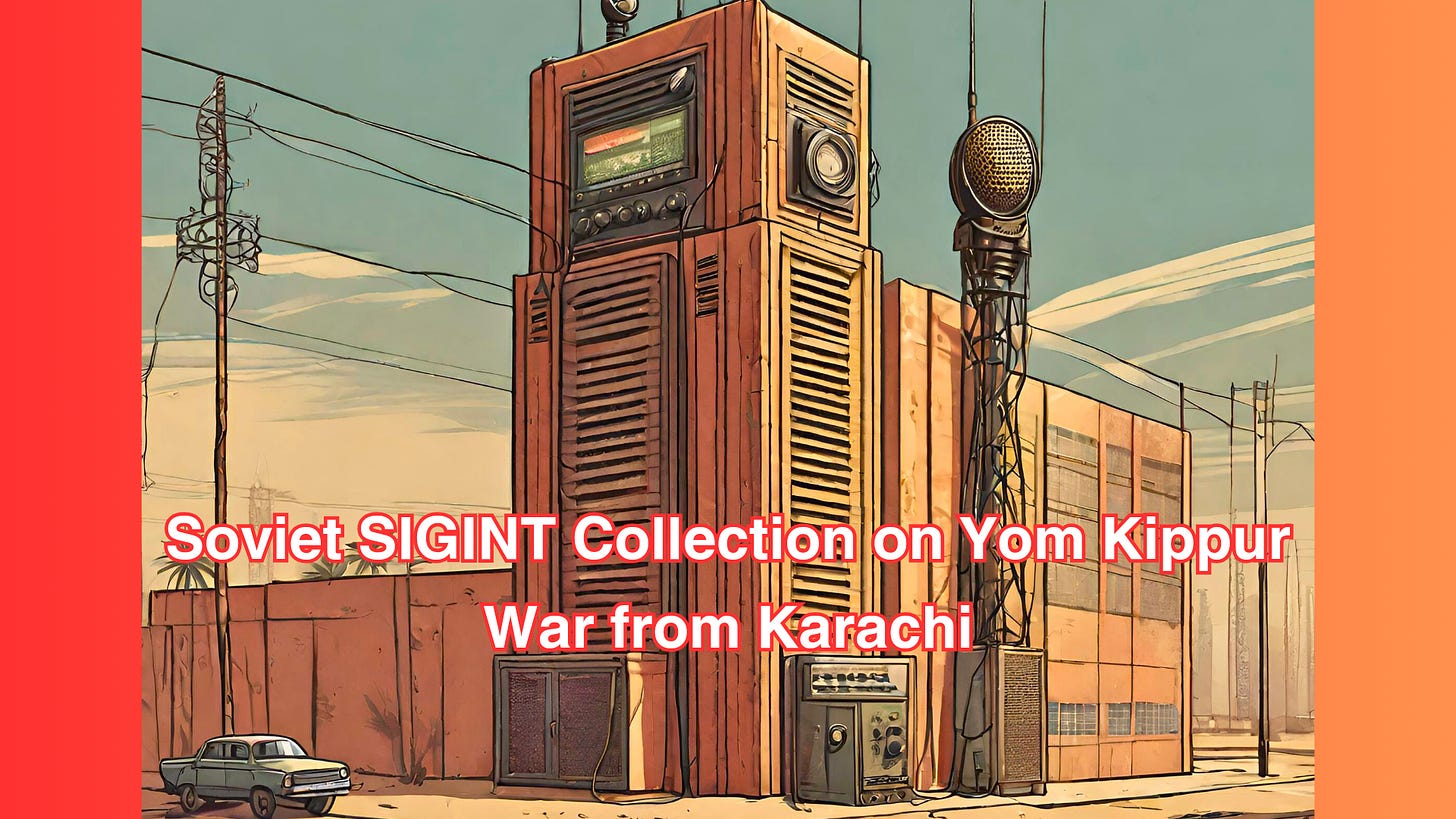Soviet SIGINT Collection on Yom Kippur War from Karachi
KGB and GRU SIGINT collection from the Soviet Consulate in Karachi
AI-generated image for representational purposes only
In December 1973, a routine assessment on Communications Security (COMSEC) prepared by the United States European Command (USEUCOM) revealed that Soviet intelligence agencies KGB and GRU were both involved in collecting SIGINT during the October 1973 Yom Kippur War from Russia’s Consulate in Karachi.
The Soviets also maintained a SIGINT setup at their Embassy in Islamabad. Reportedly, in 1976, the KGB-GRU combine had somewhere around 75 operators working in both these diplomatic establishments. The figures must have been higher three years prior.
The Soviets had high stakes in the Yom Kippur War, since it was the principal supplier of military hardware and support services to the Egyptian and Syrian militaries when both states were led by Anwar Sadat and Hafez Al-Assad, respectively.
Not that Pakistani territory was the only one being (unwittingly) used; the Soviets had a vast network of SIGINT assets spread across Europe and Asia. Their feeds alerted Soviet leadership about US President Richard Nixon's intent to deter and resist what they perceived was a unilateral military escalation in support of anti-Israel forces.
That is precisely what seems to have happened. When Nixon ordered Chairman of the Joint Chiefs of Staff Committee to raise alert level to Defence Condition 3 (DEFCON III) and mobilised bombers from Guam, the message was loud and clear. It was never publicised in the press but hoped for interception by Soviet SIGINT. Eventually, that did happen and the Soviets were dissuaded from a nuclear confrontation.
Then President Bhutto was just beginning to settle down after ending Martial Law and securing electoral success for Prime Ministership. A significant boost in Pak-Soviet ties was witnessed leading to economic and cultural agreements. These were the days when Pakistan and Soviet Russia both were trying to gain each other’s confidence.
Bhutto’s efforts to mobilise political, diplomatic and informational support for the Arabs against Israel was well known. In fact, a Pakistani Air Force pilot Air Commodore Abdus Sattar Alvi was deputed with Syrian Air Force during the Yom Kippur War. Reportedly, he managed to shoot down an Israel Mirage jet (he was awarded by the Syrian government for bravery in 2023).
That the US military was aware of Soviet SIGINT activities in Karachi is even more interesting and indicates the level of surveillance they had on Soviet diplomats.
The Prime Minister of Pakistan's principal civilian intelligence agency, Intelligence Bureau (IB), was reeling from a leadership crisis viz Director Syed Nazeer Ahmed Rizvi and effectively his successor (understudy), Agha Mohammad Ali (brother to Yahya Khan).
M. Akram Sheikh, who would later be rapidly promoted then elevated to Director IB by Bhutto, was then still a Joint Director and not able to fill the vacuum. On the other end, the Inter-Services Intelligence (ISI) led by Major General Ghulam Jilani Khan was involved in countering Baloch insurgency (including the raid on Iraq Embassy doling out supplies to insurgents), dealing with the Pakhtoonistan nuisance in Afghanistan and raising a political wing to keep tabs on Bhutto's political rivals.
In short, both the IB and ISI were knee-deep in internal political and immediate regional crises management which may have consumed much of their time.
References
Desmond Ball, 'Soviet Signals Intelligence (SIGINT): Intercepting Satellite Communications', Canberra Papers on Strategy and Defence No. 53
Desmond Ball, 'Signals Intelligence (SIGINT) in South Asia - India, Pakistan, Sri Lanka (Ceylon)', Canberra Papers on Strategy and Defence No. 117
Vitaly Nomkin and Vasily Kuznetsov, 'The 1973 October War and the Soviet Union', The Cairo Review of Foreign Affairs (Fall 2023), https://www.thecairoreview.com/essays/the-1973-october-war-and-the-soviet-union/
Steven M. Beres, Shannon M. Corey et al, 'Effects-Based Operations: The Yom Kippur War Case Study', https://www.hsdl.org/?view&did=454766
'Syria confers medal of bravery on Pakistan Air Force veteran for services in 1973 Arab-Israel war', Arab News, https://www.arabnews.com/node/2354306/pakistan
Sarfraz Khan and Noor-Ul-Amin, ‘An Overview of Pak-Soviet/Russia Relations’, Research Journal of Area Study Centre (Russia, China & Central Asia) University of Peshawar, https://asc-centralasia.edu.pk/old_site/Issue_71/001_sarfraz.html
‘From The Past Pages Of Dawn: 1973: Fifty Years Ago: Bhutto’s deep concern’, Dawn, https://www.dawn.com/news/1780659




